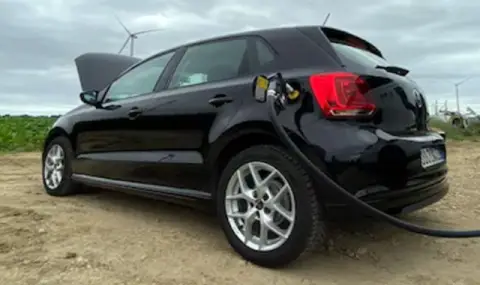With the HVO 100 fuel, which we have already told you about repeatedly, internal combustion engines are more climate-friendly even than electric cars. We will remind you that the new diesel HVO100 is already sold in Germany and is the synthetic alternative to standard diesel fuel, which is produced from waste materials.
Hydrotreated Vegetable Oils (HVO) is a renewable liquid fuel that is mainly produced from sustainable residual and waste products such as used oil. The new product belongs to the family of paraffinic diesel fuels and, with the help of a catalytic reaction with hydrogen, vegetable oils are converted into hydrocarbons.
Engine expert Wolfgang Krause wants to prove that even an old diesel Polo can be converted to run on clean climate fuel. E-fuels expert Christian Nick talks about Krause's experiment on the pages of focus.de.
Wolfgang Krause from Rheurdt-Schaephuysen is a specialist in internal combustion engines. An engineer of the old school, he was responsible for the development of powerful engines for Mercedes-Benz's AMG sports division in Affalterbach before setting up his own company in Lower Rhine.
With his company KLS, he has been devoting himself for years to engines that have little to do with sports, but do their job reliably and sustainably for years. We're talking about diesel engines that Wolfgang Krause doesn't make faster, but rather cleaner and more economical.
So already in 1999, KLS presented an interesting retrofitted car. At that time, the basis was the Seat Arosa small car. The car has been successfully tested and has received many reviews in the specialized press. EC.CO!-Arosa by KLS tops the “fuel saving list” with 3.4 liters of test consumption. For comparison: the standard 3-cylinder Lupo from VW consumes 4.1 liters of diesel in the same test, and the standard Arosa shows a consumption of 5.1 liters of diesel.

Today retrofitting older diesels with exhaust gas aftertreatment is KLS' core business. But with the Polo in question, it exceeds all expectations. Wolfgang Krause has been acquiring a VW Polo since 2014, and especially for it he developed an additional control unit that uses the advantages of the HVO diesel.
It is this control unit that adapts the VW Polo engine to new climate fuel. The main idea behind this type of control device is the best possible adaptation to a specific fuel - in this case HVO100, which, in addition to reducing CO2 by up to 90 percent, has a significantly higher cetane number and is completely free of aromatic compounds and impurities.
Oxygen and sulfur are also not included. Therefore, HVO100 contains fewer substances that need to be “processed” in the after-treatment of exhaust gases. To achieve EURO 6 exhaust gas quality for this Polo TDI, the specialist reduced the individual fuel injection quantities. But despite this, the performance of the small car (55 kW / 74 hp at 3500 rpm and 210 newton meters of torque from 1500 rpm) is preserved.
The technology is a multi-stage sequential injection, which is necessary to prepare for exhaust gas aftertreatment. This means that the catalytic converter and the particulate filter are kept at a relatively high temperature, which is necessary to treat the pollutants from the diesel mixture and burn them completely.
In addition, HVO100 is “more flammable” than normal diesel and so can reduce consumption. Because HVO100 is more flammable than conventional diesel, pre-injection is now reduced by up to 60 percent. Additionally, the main injection is set to the HVO flame speed.
Post-injection is also limited. In this way, a consumption reduction compared to the standard electronic control unit of about 8.7 percent can be achieved. In addition to its climate-friendly properties, HVO offers the potential for diesel engines to operate significantly more efficiently and at the same time become both more economical and cleaner. Moreover, after minimal refinement and regardless of their age.
